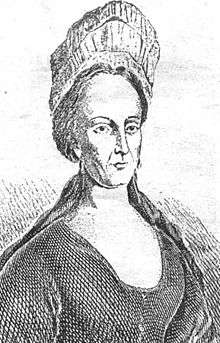Sophia Báthory

Picture of Sophia Báthory
Sophia Báthory (died 1680) was a niece of Gabriel Báthory.[1][2] She married Prince of Transylvania George II Rákóczi on February 3, 1643.[3][4] Prior to the marriage she was required by his mother to renounce Roman Catholicism in favor of Calvinism.[4] This marriage united the families of the Báthory and the Rákóczi.[3] Francis I Rákóczi was Sophia and George's son.[1][5] He was the only leading conspirator of the Wesselényi conspiracy whose life was spared, due to Sophia's intervention and a ransom payment.[6][7]:108– She also converted him to Catholicism.[4][7]:106– Sophia returned to Catholicism after her husband's death, and supported the Counter-Reformation.[8]
References
- 1 2 "JOHN HUNYADI: Hungary in American History Textbooks". Hungarianhistory.com. Retrieved 2016-07-01.
- ↑ Julia Eörsi (1929). Hungarian Heroes of Liberty. Pester Lloyd. p. 29.
- 1 2 David Livingstone (16 June 2013). Black Terror White Soldiers: Islam, Fascism & the New Age. David Livingstone. pp. 109–. ISBN 978-1-4812-2650-9.
- 1 2 3 Hugh Chisholm (1911). Encyclopedia Britannica: A Dictionary of Arts, Sciences, Literature and General Information. University Press. pp. 868–.
- ↑ Adolphus William Ward, Baron John Emerich Edward Dalberg Acton Acton, Stanley Leathes; Sir Adolphus William Ward. The Cambridge Modern History. CUP Archive. pp. 352–. GGKEY:4G4XE5DASWR.
- ↑ Kenneth Meyer Setton (1991). Venice, Austria, and the Turks in the Seventeenth Century. American Philosophical Society. pp. 248–. ISBN 978-0-87169-192-7.
- 1 2 Istvan Lazar; Andrew L. Simon (30 May 2001). Transylvania: A Short History. Simon Publications LLC. ISBN 978-1-931313-21-6.
- ↑ "Full text of "Hungary's fight for national existence, or, The history of the great uprising led by Francis Rakoczi II, 1703-1711"". Archive.org. Retrieved 2016-07-01.
This article is issued from Wikipedia - version of the 10/20/2016. The text is available under the Creative Commons Attribution/Share Alike but additional terms may apply for the media files.